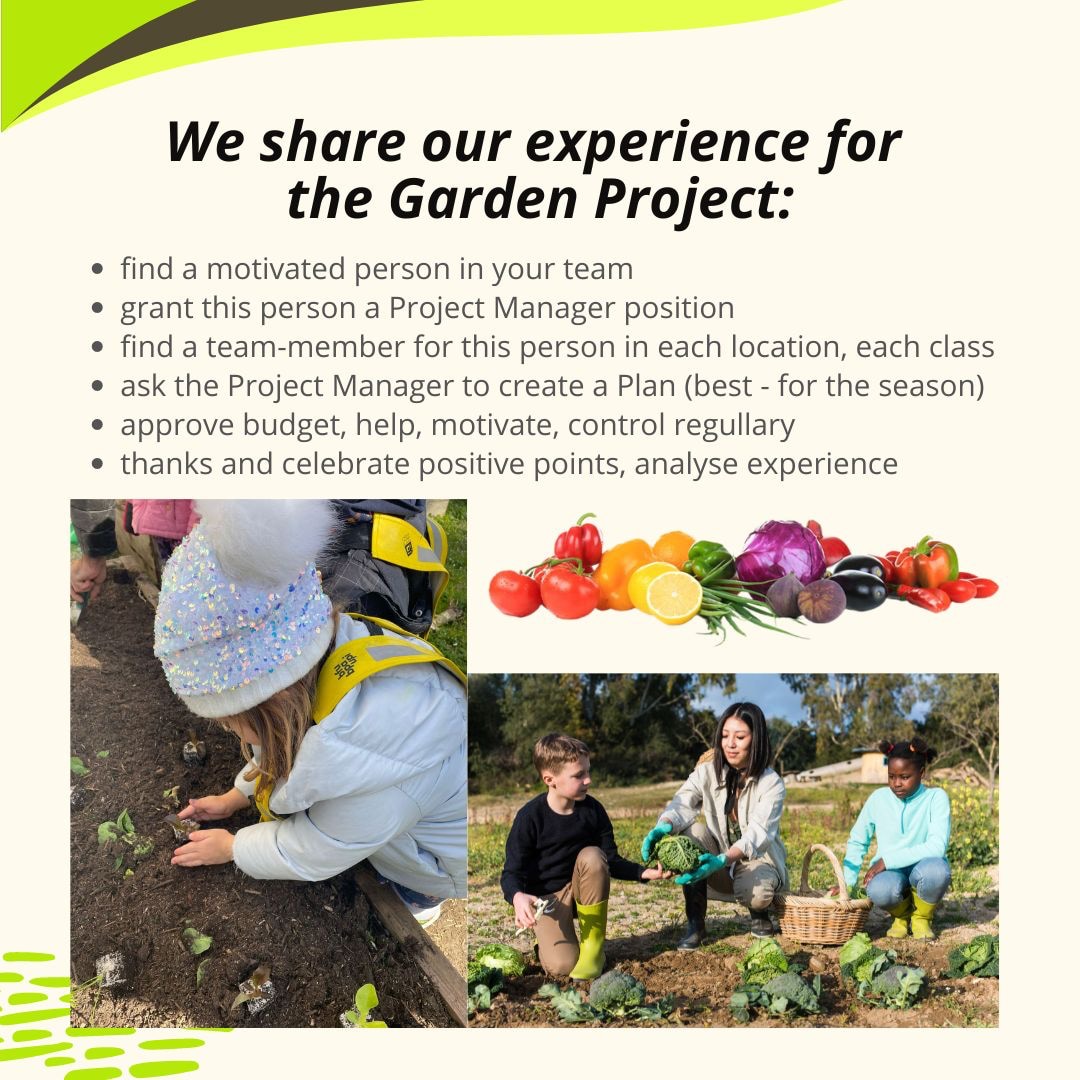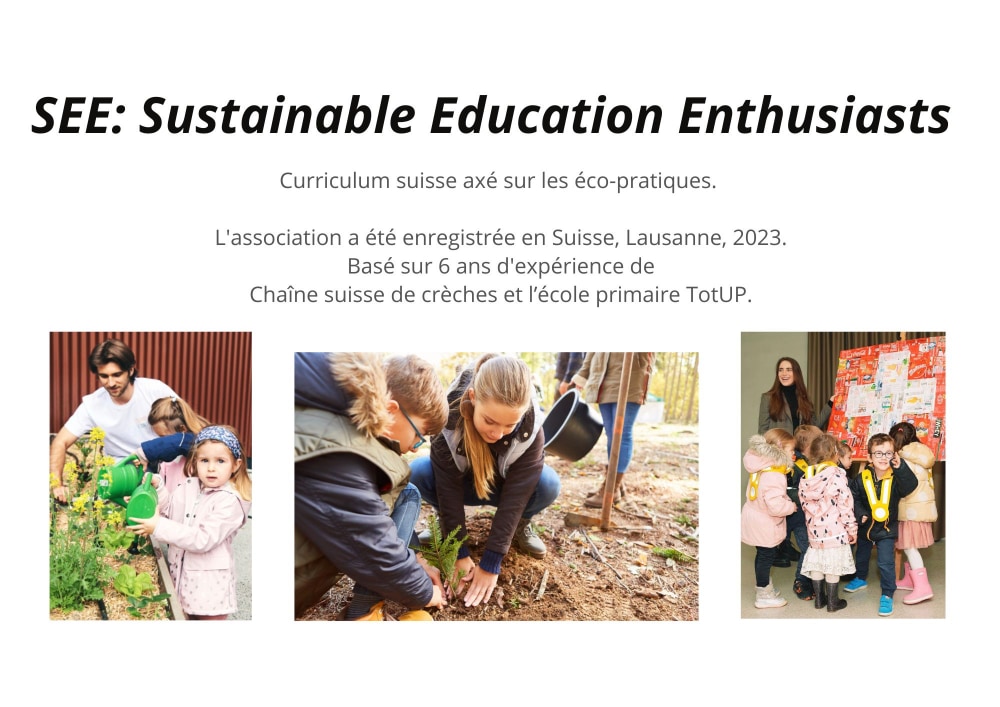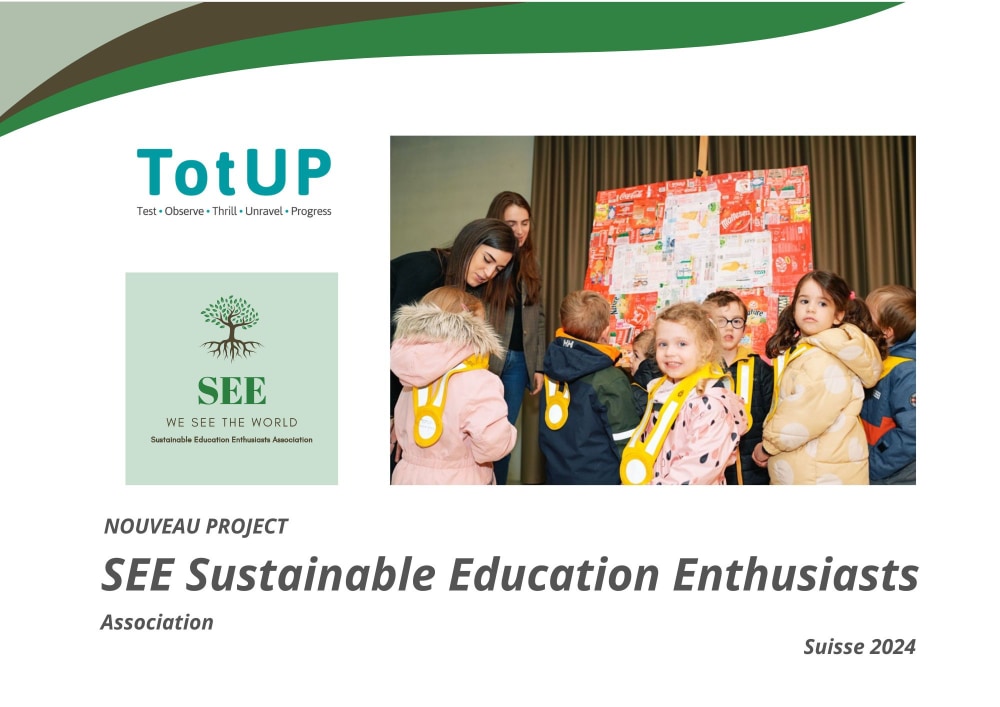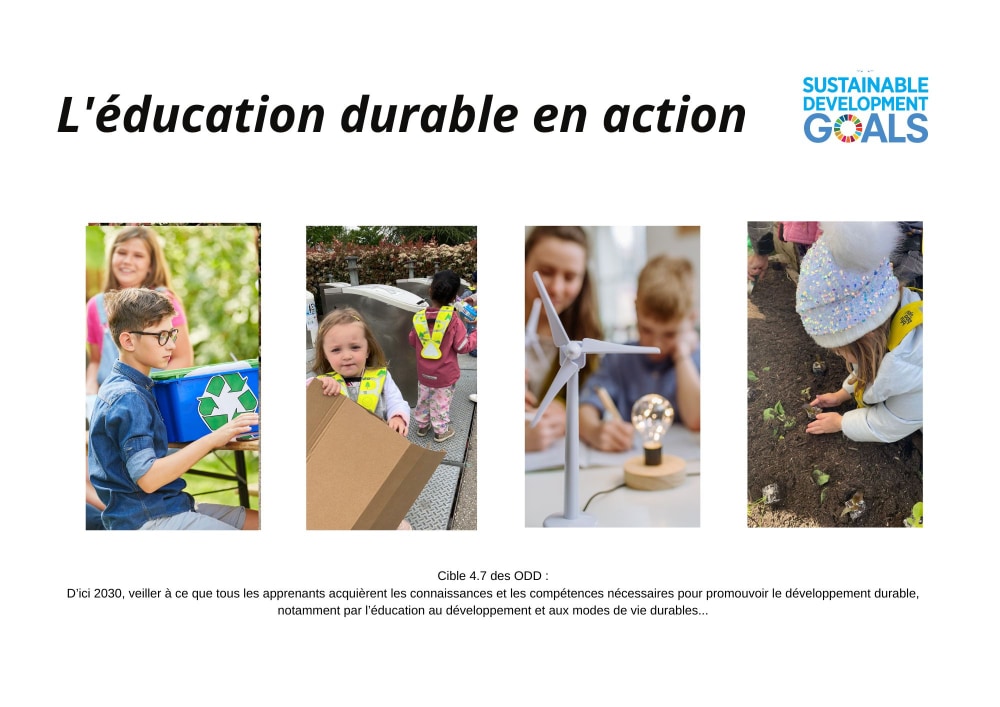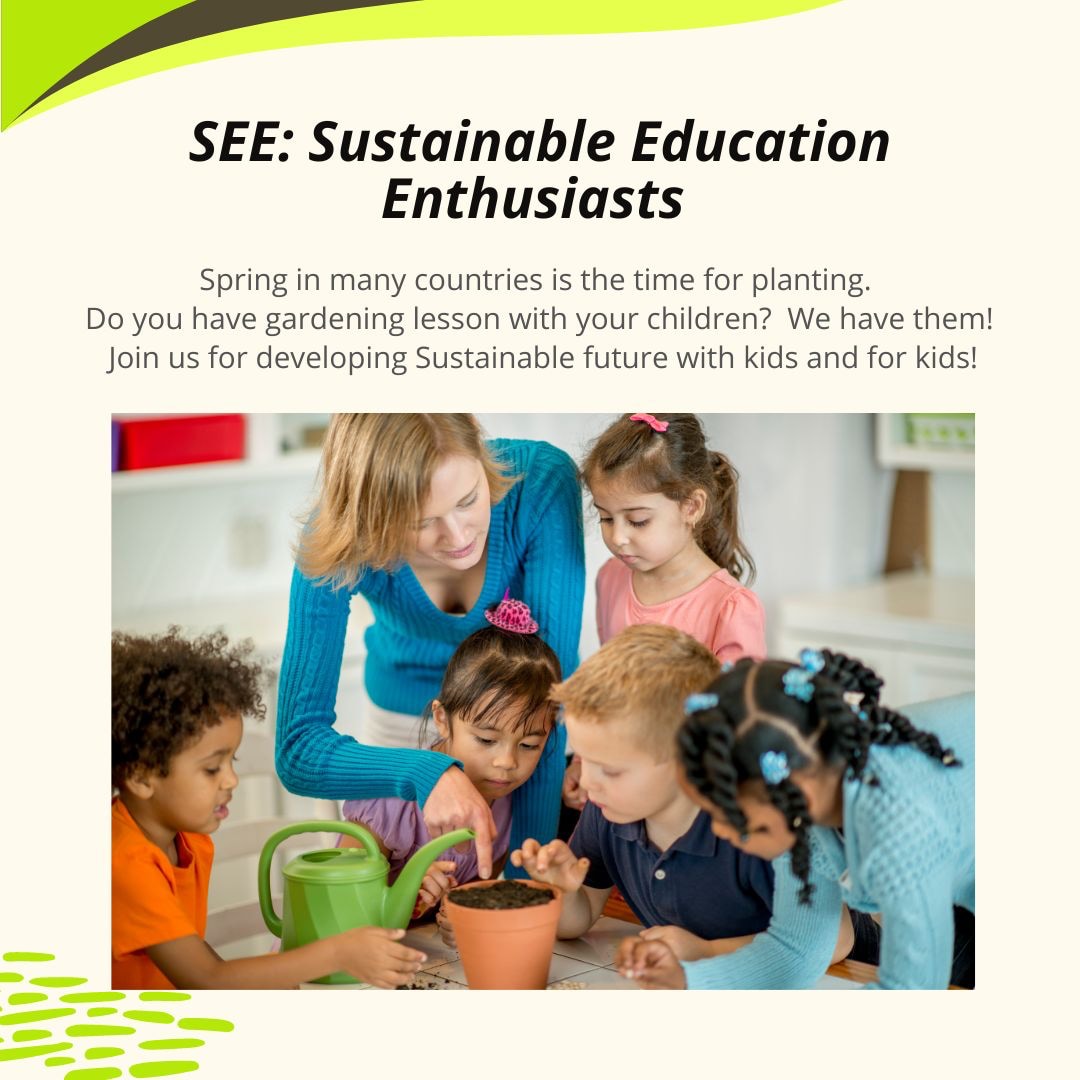Invitation to Collaboration and Co-Creation Between Schools for Sustainability and Responsible Consumption
Interview with Kristina Babina and Elena Grebeaux by Yves Zieba.
Translated, with some rephrasing done, by Marcia Banks
TotUP is an acronym for Test, Observe, Thrill, Unravel and Progress, consists of nurseries and currently operates a primary school in Petit Lancy.
Private Daycares and Primary Schools in French-speaking Switzerland: TotUP
YZ: What is the goal of TotUP.ch?
KB / EG: Our objective is to collaborate with as many schools as possible to encourage the implementation of an education on sustainability and to demonstrate the educational value of our proposal. Sustainability is a topic that cannot remain a private undertaking or be confined to a school. This is why we wish to share our pedagogy and help other schools be certified as schools supporting sustainability.
YZ: Are you considering becoming a label?
KB / EG: Our training center is EduQua certified. We have the possibility of performing audits, to develop a project then to provide certification.
YZ: How can a school interested in sustainability initiate collaboration with you?
KB / EG: Schools become members of the SEE (Sustainability Education Enthusiast) association, an exchange hub for early childhood, ages 18 months to 8 years, where we co-create projects. We meet once a year.
YZ: Do you have examples of projects that you may share with us?
KB / EG: We can provide several examples:
Responsible Consumption:
- We raise awareness about fighting waste; this begins from a young age with how food is served in order to minimize waste.
- In most cafeterias, plates are served without asking the children how much they wish to have or will eat. The children are given a bit of everything as part of their menu.
- Our solution allows for food recovery instead of food disposal, thanks to a partner company. This example illustrates how simple values on sustainability can be transmitted and embraced at an early age along with the philosophical approach of respect for food.
We have observed that children influence the behaviors of their parents, and these children can be key players in having the adults at home create less food waste.
Intergenerational and Intercultural Projects
We propose workshops. Those we have organized in senior homes and care facilities have gone over well. We create connections between expatriate families and seniors, the latter who are familiar with the city and the canton, thus resulting in an education activity program that is sustainable.
A5 Cards Co-Developed by Professionals and Children
These cards feature an illustration and three to five words.
“Sustainable Art Expo”
We collect paper and various items often thrown away that allow the children to create their pieces of art. Instead of discarding packaging, we reuse it. For instance, a Christmas tree was made using discarded egg cartons. An outcome of this activity is that the children learn first-hand the concept of the volume and the quantity of packaging that goes to waste. A project such as this, over a period of several months, helps provides a venue for creative expressions as well as strengthen the elements of good teamwork.
No Toy Day
This is a practice we have implemented these past six years. We have noticed that play space is freed up, outdoor art takes place, the imagination is stimulated with the children creating their own games, and a side effect is that the children help tidy and organize the classroom.
YZ: What results have you observed after a no-toy day?
KB / EG: We find fewer conflicts and children play more together without the toys. The feedback from the staff has been very positive.
YZ: Can you tell us more about your structure and organization?
KB / EG: Our organization involves 140 employees. We make use of synergies through educational exchange programs and use an approach where we listen to each collaborator’s ideas, appropriate their knowledge gained from the Swiss education system and experiment with international practices.
YZ: Have you found some of your sustainability activities difficult to implement?
KB / EG: Yes, there have been some resistances. Some think that “it adds work”. Some, in the education sector, are simply not in the habit of doing collaborative projects. There may also be various levels of interests and variables in perceptions regarding the concept of sustainability. Some schools already offer additional activities such as yoga, dance, music, and more than these, and may feel that adding more is too much for the children or perhaps too complicated to add to the palette.
YZ: Can we say you develop children’s soft skills?
KB / EG: Yes, TotUP.ch’s philosophy aims to cover a broad spectrum of activities while focusing a great deal on emotions and the social integration of children in their environment. Children develop their soft-skills with the help of educators, through excursions, communication with senior citizens, communication with animals, yoga, gardening work, and much more.
YZ: How do you allocate projects? Who decides?
KB /EG: Project allocation is based upon motivation. A project leader is necessary for being responsible for the program and to ensure an effective management.
YZ: You seem to emphasize responsible food consumption.
KB / EG: We create vegetable gardens using the concept of a permaculture, partnering with Les Légumes Perchés. We create weekly “homemade snacks” using ingredients from the garden. We share recipe ideas with educators and follow up with discussions of what possibilities we may have, using our harvest in order to create new recipes, thus increasing an interest in the consumption of fruits, vegetables, and vegetarian dishes.
YZ: What results do you see with the homemade snacks?
KB / EG: We have observed that 99% of children eat what they have harvested and prepare. With the help of a nutritionist, we have developed 50 easy-to-make recipes using easily to find ingredients, including flour, water, and spices. The children get into the habit of eating seasonal fruit and vegetables.
YZ: Is your model transferable to corporate daycares and to other schools?
KB / EG: Yes. We are able to integrate one or more of our projects into Swiss daycares centers and schools as well as schools beyond our borders. All of our programs are available in English. We can also collaborate with non-educational institutions. For instance, employees’ children can participate in an art workshop using company items deemed as rubbish, led by our art professor, Pauline, who has her doctorate in Fine Arts, creating art and learning art history at the same time. These activities can be proposed in days allocated to families or within the framework of a team building exercise, with the aim of promoting an education in consumable foods from the local environment.
YZ: Thank you for sharing these concrete examples.
Bios:
Kristina Babina / Debureaux
- Over 10 years of corporate experience
- Expert in preschool and Swiss education
- Guest speaker at conferences and universities
- Co-founder of several associations
- Business coach
- SME & artisan brand ambassador
- Mother and woman’s coach
Elena Grebeaux
- Over 20 years in international trade
- Experience in the USA, Europe, China, Kuwait, post-Soviet countries
- Startup mentoring
- Managed international groups and startups from scratch
- P&L responsibility, strategy, branding
- Country Manager, Sales Director
- Managed up to 100 locations, with teams up to 450 employees
